- Home
- Kenneth Eade
Paladine Page 2
Paladine Read online
Page 2
“With all due respect, Bill, he did you guys a favor.” Anderson bit his lower lip. They just couldn’t change their mindset. To them, the “case” was Paladine, the murderer of a young jihadist – never mind that he had prevented the murder of dozens of innocents – instead of the next terrorist, lurking out there, with his finger on the trigger or detonator switch, waiting to make his next deadly move. That’s how the FBI worked, on a case-by-case basis. In the war on terrorism, Anderson felt a more broad-stroke approach was warranted.
***
Bryce Williamson had built his empire from the ground up. He had invested well, weathered all the major financial crises of the late 20th and early 21st centuries, and was able to retire a rich man. His $30 million penthouse apartment in the city of San Francisco was ultra-modern, but garnished with classical French and Italian furniture that had been purchased from Christie’s and Sotheby’s. Once handcrafted for royalty, the richly ornamented antiques from the Ancient Regime of varnished wood and sleek, slender, delicate legs were works of art in and of themselves. To match the period, on his walls hung the true artistic masterpieces of Van Gogh, Monet and Pissarro. Hidden in a masterfully hand-painted cabinet was an instrument that tied Williamson’s furnishings to the modern world – a television, which was spewing out entertainment called “news.” All the talk was about the mysterious vigilante they were calling: Paladine.
Williamson’s ears perked to the story as he attempted to drown his sorrows with shots of expensive scotch. This had been his pastime since retiring. That and a long battle with lung cancer, to which he had eventually gracefully conceded.
Williamson had reached a pinnacle in his professional and financial life, only to find that he had nobody to share that wealth, or life, with. His only son, John, had died in a horrible terrorist attack in San Francisco in 2006. His beloved flesh and blood, the heir to his legacy, had been wiped out by a jihadist who had run down a bunch of people on a crowded San Francisco sidewalk. Bryce couldn’t cope with the loss and it didn’t take long for grief to turn to outrage. He pulled all his well-paid strings for action – the police, his congressman, even his local senator – but the scum who killed his son was found not guilty by reason of insanity and was now languishing in a state mental hospital instead of the gas chamber. Bryce’s anger, like his cancer, had metastasized and incensed him to the point of action. Others, his peers, had amassed great wealth and had created their own charitable foundations. Start a cancer foundation! Do something good for the world! They all had told him the same thing. Coughing, he pushed the glass away, grabbed the remote control, and flipped around, searching for more news reports about the foiled McDonald’s’ attack and the mysterious, elusive Paladine.
Bryce turned his attention to the screen. The news commentator, an above-average looking woman, was summarizing the comments from ISIS about the stymied McDonald’s attack. She was interpreting the videotaped comments of the ISIS spokesman, who said Abdul Moussef was a hero, a martyr, and called upon every jihadist to kill as many American infidels as possible. He also vowed that they would hunt down, crucify and behead the one known as Paladine. Williamson decided right then and there what legacy he would leave to the world, while at the same time extracting his revenge against the killer of his son and his mentors.
CHAPTER FOUR
Robert Garcia holed up in an apartment hotel in Harlem that didn’t have a guest register, which was managed by a heavily armed ex-soldier whose conscience had joined Robert’s in Never Never Land. He had taken one look at Robert and understood his need for privacy without asking. The hotel was a dive, but next door there was an Internet café that Robert could hack into.
Robert was pissed off. He couldn’t stand the fact that he had spent his military career fighting these filthy jihadists and now they were right in his own backyard.
They need to be taught a lesson.
He stewed as he sat on the yellowed mattress in his small, roach infested studio, with the black and white TV on in the background. A reporter was talking about the McDonald’s terrorist, so he turned his attention to the report.
The mysterious savior has been dubbed by social media sources as “Paladine.”
Suddenly, he had an epiphany. Robert had to descend into the bowels of the Darknet, the cyber-haven of drug dealers and child pornography peddlers, whose currency was the untraceable Bitcoin. Robert didn’t dare use the traditional Internet. The feds would surely be looking for his cyber fingerprint. The Darknet was his domain, where he could do his research and send messages encrypted in layers. Those messages would travel through a series of anonymous routers and their origination would be forever unknown because an investigator would only know the location of the router before and after the current layer. The message was decrypted only on the receiver’s side using a PGP, or public key.
Armed with his impeccable Arabic, he trolled the blogs, chat rooms, and Twitter and Facebook pages of the virtual caliphate, watching beheading and crucifixion videos and skimming the radical Islamic sermons of the jihadist movement. He created an Islamic handle for himself as “Jamal,” the Muslim immigrant from Jordan who was curious how he could do his part in the global jihadist movement without having to move to Syria. It didn’t take long for an ISIS recruiter to contact him, and point out a place where he could learn more about the jihadist philosophy.
***
The place was the Islamic Academy in Bay Ridge, in a mosque which had been established by the North Atlantic Islamic Trust, which had long been suspected of providing bases of operation of jihadists, and whose several facilities had in fact harbored terrorists. To look the part, Robert had trimmed his dark, curly beard and shaped it like a boomerang around his chin, jihadist style. When Robert arrived, he passed all his initiation examinations in his perfect Arabic under the watchful eye of a radical Islamic cleric, and then was invited to attend a discussion group in the basement of the mosque that treaded the thin line between Islamism and terrorism, which was led by a 20-something Saudi who appeared to be the oldest person in the room, except for Robert.
Talk was buzzing around martyrdom, the McDonald’s attack and their new hated enemy – Paladine. The discussion then focused on whether a suicide bombing would have been more effective than an attack with an automatic weapon. The Saudi explained that the message of Islam was that it wasn’t important how many infidels you took out. You should try to kill as many as possible, but even if you took the life of only one infidel, you would be a martyr and have a permanent place with Allah in Jannah. It also wasn’t crucial what type of weapon you chose. Robert volunteered his opinion.
“Either way, you end up dead.”
One of the boys, who looked no more than 18, stood up and got in Robert’s face.
“What’s this to you, old man? What do you know about it?”
“I know plenty. Who’s your leader here, this guy?” Robert motioned with his head cocked toward the Saudi guy.
The Saudi replied, “Our only leader is God. I am a teacher.”
“Oh, so you’re a teacher?” Robert’s bearded face broke out in an evil grin. “And this is the kind of horse shit you think is right to teach to these young impressionable minds? Promising them a better life after they off themselves? Death is just death. There’s no Jannah, and I can prove it to you.” The boys looked at Robert in shock as he focused his expressionless, shark-like eyes on the teacher. “I’ve got a math problem for you, teacher.” Robert pulled out his gun from his shoulder holster and panned it in front of the startled participants. “How many of you lunatic jihadists can I send to meet your God with this one little gun?” He pulled and waved his Glock at them and cocked his head to one side and smiled. Then he took aim, shot the teacher in the head and killed him instantly. “Tell your other teachers Paladine sends his regards.” Robert backed out of the room, moving the pistol from boy to boy as they covered their faces and screamed in horror.
Robert knew he needed to leave New York, and immediately. He
descended into the subterranean underworld of the New York subway, ducked into a bathroom, wiped the gun clean and disposed of it by burying it deep in the trash can. Then he headed for Penn Station. There, he paid cash for a ticket to Chicago. If he decided to go further from there, he would buy another ticket in Chicago on another day. Long-term trips were too easy to trace.
***
The intern knocked on the door of Nathan Anderson’s private office at NCTC.
“Come in.”
The young lady smiled, and left a memo on his desk.
“Thank you.” Anderson looked at the memo and frowned. Another jihadist from the TIDE database had been assassinated, and this time the shooter left a calling card – Paladine. He put out an alert to all domestic and international agencies NCTC was intended to serve. Paladine, whomever he was, had to be identified and apprehended.
CHAPTER FIVE
Bryce Williamson had finally found his charitable inspiration. He summoned his lawyers and created the John Williamson Foundation to Fight Terrorism. On the surface, it was a normal, legitimate charitable institution. But in the substratum depths of its understructure, it had an opprobrious purpose – to kill every suspected terrorist who lurked in every sleeper cell in America, beginning with the so-called “insane” jihadist who mowed down his son in 2006 and who was relaxing in a mental hospital instead of waiting on death row where he belonged. Williamson made a sizeable contribution to the foundation himself, and then called upon everyone who had ever benefited from an association with him in business to contribute. Most of his former associates donated with only a modicum of persuasion. Others he coerced into it with friendly extortion. Throughout his many years of business, Bryce had come to know where all the bodies were buried. When he received a negative or non-enthusiastic answer, he simply gently resorted to blackmail. This local politician had taken bribes; therefore he must contribute. Want that evidence of toxic waste cover-up for construction of your high-rise apartments to remain under wraps? Pitch in. If the object of the shakedown threatened to expose Williamson’s role in it, he had a simple and ironclad defense – he was going to die and he didn’t give a shit.
He put his formerly busy legislative lawyers to work on drafting bills to put into the hands of the unscrupulous senators and congressmen who had taken payoffs. It was pay-back time. The laws were archaic and did not allow federal enforcement agencies to prevent terrorism, only to prosecute accused terrorists. Those laws had to be changed.
Williamson put his webmasters to work on developing a beautiful website for the foundation. No expense was spared. Journalists who had been compelled to “work for food,” peddling each of their articles to the mainstream publications which would still pay, were employed on the foundation’s payroll to research and write about counterterrorism and prevention. The Editor-in-Chief, of course, was Bryce Williamson himself. But beneath that legitimate online iceberg, lurking in the stinking depths of the Dark web, was the “other” website, the subversive one which could only be accessed through the TOR onion router. This site offered articles recommending counterterrorism prevention. Some writers even postulated assassination of suspected terrorists. Bryce intended to build an army and he wanted Paladine to be his general.
CHAPTER SIX
It had been a while since Robert had been on a hunt and he was getting restless. He didn’t like Chicago that much. The pizza pie was okay, but they called it a “deep dish” – not a pie. He missed drifting through the New York street crowd, selecting hypothetical victims, plotting the murders in his mind and his subsequent getaway into the shadows. He was running out of money and he spent his nights surfing the sewers of the deep web, looking for potential employment. Finally, he latched on to a website called “CounterTerror.onion,” What had caught his eye was an article that praised Paladine and advocated assassination of all suspected terrorist cells in America and Western Europe. The article was anonymous, but contained a PGP Public Key contact for the journalist who had written it.
Robert composed an encrypted message to the author of the article, asking for more information on how he could get involved, then went off to grab a late dinner. When he returned with his “deep dish” pie, he checked his PGP and, to his surprise, he found a response. It said simply: Are you Paladine?
***
Communicating with encrypted messages using the TOR browser was frustratingly slow. The site had no chat rooms. In fact, there were a limited number of them on the Darknet. Robert responded back with: “Are you a cop?” All kinds of law enforcement agencies were known to prowl the Darknet in cyber undercover. After several days of overly circumspect back and forth messages on both sides, a meeting was arranged. It would be on Williamson’s home turf but on Robert’s terms.
Robert prepared his black knapsack as a go-bag with his stash of cash, three prepaid cellular phones, two prepaid credit cards, a small pillow, a blanket and some other essentials. He dressed in black jeans and a black shirt, shoved a knitted black winter hat into the pocket of his black jacket, holstered his new 9mm Glock and strapped the Ruger SR22 onto his ankle. He slung the backpack over his shoulder and stepped out of the hotel room.
Robert was a good two days ahead of schedule for the meeting with the anonymous contact from the website who was known to him simply as “B.” He wanted to prepare for the rendezvous and set the layout so that there would be no surprises. In Robert’s business, one surprise could be fatal. The train yard in Chicago was filled with infrared cameras and heat sensors, so Robert decided to hop the train outside the yard, while it was still building up speed. He didn’t want to have to shoot anyone who tried to ruin his travel experience – that would destroy the entire idea of traveling anonymously.
For the next two days, Robert rode the rails, leaving not even a trail of bread crumbs to follow. As the train decelerated on its way into the San Francisco train yard, Robert jumped off and silently drifted away from it like a thin coat of fog, blending into the night air. When Robert had cleared the yard, he whipped off his mask and stuffed it into his backpack. No need to call attention to himself. He was also unlikely to hitch a ride from anyone if he was dressed like a burglar.
Robert hit the highway with his thumb outstretched. It took a while, so he walked along the road, munching on some peanuts from his bag. Finally, a beat-up, old white 70s-era Chevrolet Impala chugged over to the side. Robert trotted up to the passenger side window, which was rolling down.
“Where ya headed?” A beefy white man with a shiny bald head and a thick grey beard cocked his head through the window and smiled at Robert.
“San Francisco.”
The beefy guy motioned with his tank-topped arm. “Well, hop in then, buddy.”
Robert opened the door, tossed his pack into the well of the passenger’s seat, sat down and closed the door.
“What’s your name?” asked the beefy guy as the Impala puffed up dirt from the shoulder. Robert thought for a split second.
“You can call me Bill.”
A smile of yellow, crooked teeth broke out beneath the beefy guy’s beard. “That’s my name!”
Robert held out his fist for a pump and the real Bill tapped it.
“You a vet?”
“How did you know?”
“You got the look. Plus, I know the train yard is just a couple miles away from here. I pick up a lot of vets on this route. 18th Cavalry, National Guard.”
“22nd Infantry Regiment.”
“Regular Army?”
“Yeah.”
“You must have seen action in Iraq.”
“More than I care to talk about or recall.”
“Understood. Well, it’s good to have a brother in my car. We should be in the city in about a half hour. I’m headed toward the Embarcadero.”
“That suits me just fine.”
Bill shook out a pack of cigarettes, pulled the top off with his teeth and tapped it on his brawny biceps. He popped out a filter tip and offered it to Robert.
&nbs
p; “No thanks, don’t smoke.”
“Smart man.”
Beefy Bill didn’t know the half of it.
CHAPTER SEVEN
Robert let a room at the Bradley Hotel on Pine Street. It was not too dirty, and he was able to check in by turning over three “Ben Franklin” IDs. That brought the cost of the room up to $342 for the first night. Robert figured he would only need it for two at the most. After getting his key, he went outside on recon to explore the lay of the land and set the area for his meeting. Robert knew he wanted the meeting to be downtown, so he rode the cable cars to select the perfect spot. He found that place at a little restaurant in Chinatown. It was off the beaten path, had a small number of tables, a glass front so he could observe the goings-on outside, a quick back exit through the kitchen and very good dim-sum.
Robert walked the route he had plotted out to lead up to the meeting. Cable cars were a perfect mode of transportation because they were slow and Robert could follow along and observe the car while at the same time concealing himself in the crowd. He purchased four prepaid cellular telephones at a Walgreens and continued to plot his course. Finally, everything was as perfect as a plan could possibly be, which did not guarantee that anything or everything could not go wrong, so Robert went over it again and again in his mind.
***
Robert held the disposable cell phone up to his lips. “Hello, B, are you ready for our little rendezvous?”
Bryce Williamson was shocked. Could this be Paladine? If so, he was better than he had thought.
“How did you get this number?”
“The only number not traceable is one that doesn’t belong to you. Something to remember. Now, I want you to listen carefully, because I won’t be repeating this.”

 Brent Marks Legal Thriller Series: Box Set One
Brent Marks Legal Thriller Series: Box Set One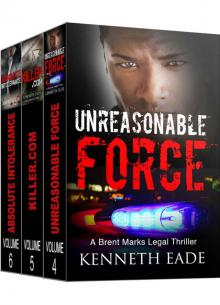 Brent Marks Legal Thriller Series: Box Set Two
Brent Marks Legal Thriller Series: Box Set Two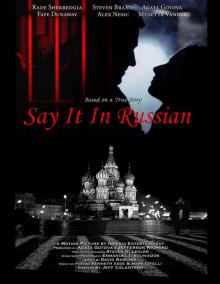 Say it in Russian
Say it in Russian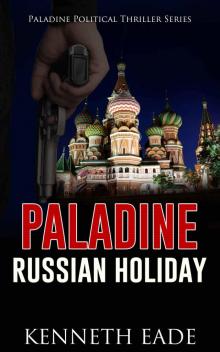 Political Thriller: RUSSIAN HOLIDAY, an American Assassin story
Political Thriller: RUSSIAN HOLIDAY, an American Assassin story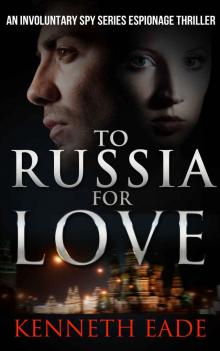 Spy Thriller: To Russia for Love: An Espionage and Pulp Fiction Political Thriller
Spy Thriller: To Russia for Love: An Espionage and Pulp Fiction Political Thriller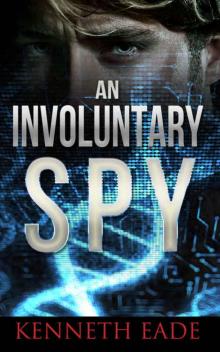 Spy Thriller: An Involuntary Spy: An espionage thriller
Spy Thriller: An Involuntary Spy: An espionage thriller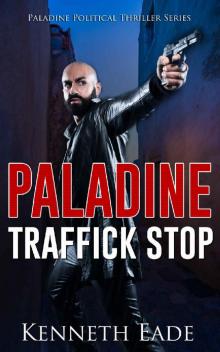 Traffick Stop, an American Assassin's Story (Paladine Political Thriller Series Book 3)
Traffick Stop, an American Assassin's Story (Paladine Political Thriller Series Book 3)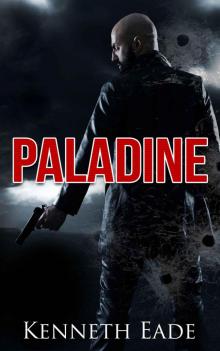 Paladine
Paladine